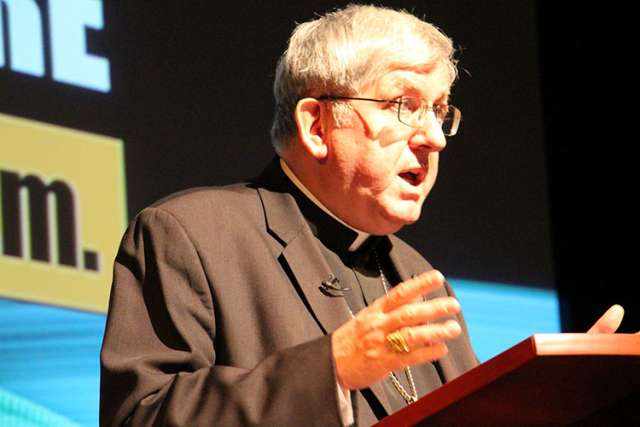Collins was the final speaker at the three-day Faith in the Public Square event that invited Catholics, the general public, media and the legal community to attend a series of talks that focused on religion and society. Organized by the Archdiocese of Toronto and St. Augustine’s seminary, the event ran from Aug. 5-7.
The cardinal argued that there are two ways to live one’s life. Currently, the more popular path is the way of the individual ego in service of the self. The way of Thomas more is the way of sacrificial virtue in the service of the common good. Thomas More was an Englishman, family man, lawyer, author, social philosopher and advisor to King Henry VIII, but was imprisoned and then executed after public disagreements with the king who put his desires before duty.
“Thomas dealt with a society in which the supremacy of the will of the sovereign threatened the existence, or at least the liberty, of the Church, because the Church... with its Gospel teachings, was a check upon the royal ego. It is a check upon the overweening pretentions of the state. It reminds the tyrant that he is wrong to establish a system in which there are only two entities: the all-powerful state, and the isolated and powerless individual. A healthy society has many groups flourishing between the state and the individual,” said Collins. “Ultimately, Henry wanted to be both King and Pope... Tyrants have always attacked the Catholic Church, because it refuses to be a department of the state. Whenever in local cases the Church has become too enmeshed with the state, it has lost its integrity.”
Collins drew from a more contemporary example, a tale of two brothers: King Edward VIII and Prince Albert who would become the great King George VI after his elder brother abdicated the British throne to marry American divorcee Wallis Warfield Simpson. George’s rise as the royal who served society from behind the scenes due to his speech impediment to a man England was proud to call king — from spare to heir — was documented in the film The King’s Speech.
“He (Edward) wanted his will to prevail, not noble but invisible universal principles like marital fidelity, sacrifice, duty and kingship, none of which were as real to him as was Wallis. When the authorities of the state said that this was not possible, he abdicated,” said Collins. In comparison, Prince Albert “in all his struggles, he sought not to exalt his ego and satisfy his desires, but rather to offer his life as an oblation in service to the common good of his people, guided by unseen but, for him, most real noble universal principles: kingship, duty, nation, fidelity etc. By sacrificing self in the service of noble universal principles he attains greatness as an individual, while his self-referential brother does not.”
From More, says Collins, we can learn about friendship and family, about public service and a “State governed by law rooted in justice and truth,” a conscience rooted in truth as opposed to feelings shaped by the ego and the necessity to pray and study. Collins encouraged the audience to read More’s writings, including letters to his daughter Maragret, and to watch A Man for All Seasons, the story of the saint that has been on the stage and in film.
“His Eminence, Cardinal Collins presented on the moral example of St. Thomas More,” said theology professor Dr. Josephine Lombardi, who moderated the cardinal’s talk. “He reminded the crowd that ‘our ego and desires need to be governed by a reasoned search for truth, that helps us all discover the universal realities that are the stars we steer by: that is necessary for individual and social greatness, and peace.’ His Eminence affirmed the relationship between truth, reason and an informed conscience. St. Thomas More was a martyr of conscience. He refused to compromise and be enslaved by corrupt policies. He is a model for all public leaders.”
“As each of us makes his or her brief journey through this valley of tears,” said Collins, “we need help to find the path to our destination. Life has a destination, and a purpose greater than the fulfillment of our individual selves, and in seeking that we find meaning, and peace, and joy.”


